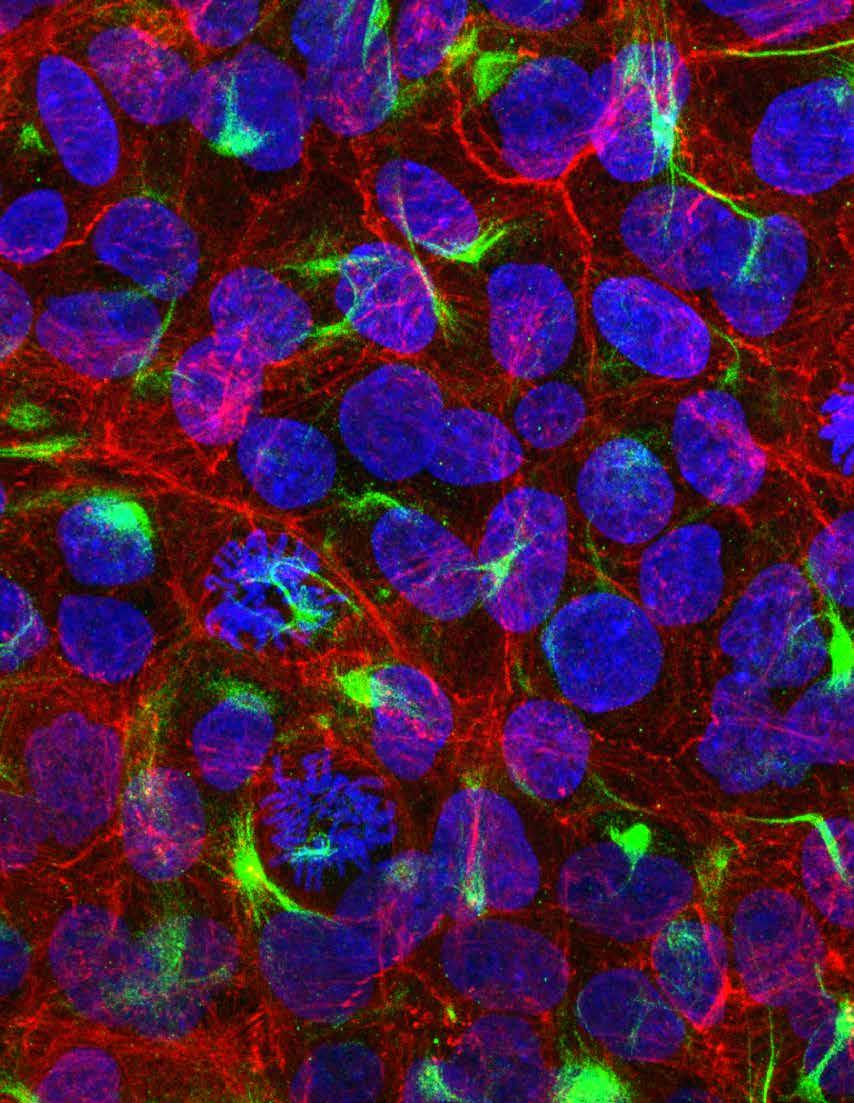
3 minute read
From the dean
Across Disciplines. Across the World® // spring 2021
Racial justice in Engineering
The road ahead for McKelvey Engineering

Snapshot //

Research in Amit Pathak’s lab focuses on understanding how normal and cancerous cells sense and remember varying biomechanical cues present in the tissue microenvironment. The image represents a merge of vimentin (green) expression in MCF10A breast epithelial cells monolayer after 72H of cell culture on collagen coated soft polyacrylamide gel, actin cytoskeleton (red) and cell nuclei (blue).
Image by Florence Flick Jaecker, a postdoctoral associate in the Pathak Lab.
Aaron F. Bobick Dean & James M. McKelvey Professor afb@wustl.edu
washu photo
The Long Road Ahead
I write this letter as we are wrapping up what will be remembered as the most unusual academic year in living memory. The COVID-19 pandemic, which last spring was a crisis requiring an immediate response to launch online learning, grew into an ever-present constraint that impacted teaching, research and all aspects of operations across the university. For the Fall 2020 and Spring 2021 semesters, McKelvey Engineering needed to embrace new paradigms of teaching and learning, to develop new modes of managing and sharing research spaces, and to conduct business operations almost exclusively through remote interactions. In the pages of this issue of Engineering Momentum, you will read about some of the efforts it took to rise to the occasion. Given the enormity of the task, one might expect responding to COVID-19 to be the cover story of this issue of the magazine.
It is not.
Instead, the summer of last year saw the emergence of an awareness of a challenge that has been with us for centuries and whose destructive power is not amenable to being controlled by a vaccine. While the most visible event of the summer was the video-captured death of George Floyd at the hands of police officers, there was a litany of such tragedies and travesties. These incidents energized a Black Lives Matter movement that is supported by persons of all backgrounds. Fundamental to the conversation is the declaration that these occurrences are neither new nor particularly more severe than those experienced by Black members of our community in every corner of society. There arose a demand that the time for true action has arrived.
That demand for action has made its way to McKelvey. As I mentioned in a short message released last summer, I was hesitant to simply offer words of sympathy and understanding. I was concerned that words could ring hollow and believed the school would need deliberate and sustained action that could, over time, make a difference: actions that would begin by uncovering some very uncomfortable truths and then seeking common ground to address them; actions that would identify sources of toxic climate and eliminate them; actions to inform and education all members of the McKelvey Engineering community.
This is hard work. It is not work that will be finished this semester, this year or this decade. Rather, it is work that will be ongoing. In our cover story, you will read about some initial efforts along with individuals who are stepping up to help McKelvey establish a sustainable plan to combat systemic racism within our School, our university, and our profession. We have tried to be as forthright as possible in our coverage. You may dispute some of the observations made in the story — that’s ok. One of the things I have learned in the short time since we have begun this effort in earnest is the deep variation in perspectives among members of our community. In fact, one of the first important steps in this process is to learn about other people’s perspectives. I hope this story at least accomplishes that goal.
As always, I welcome your thoughts. And in this matter, maybe more than ever.



